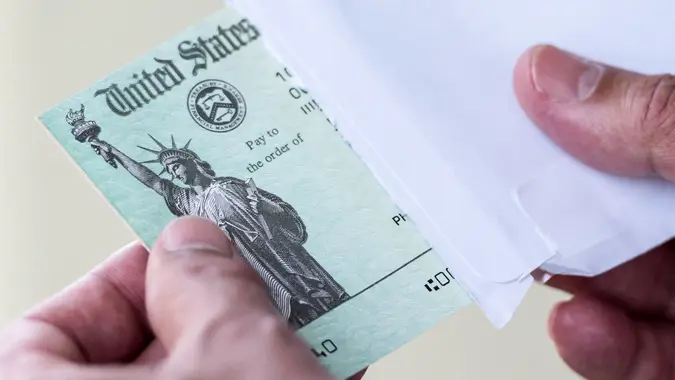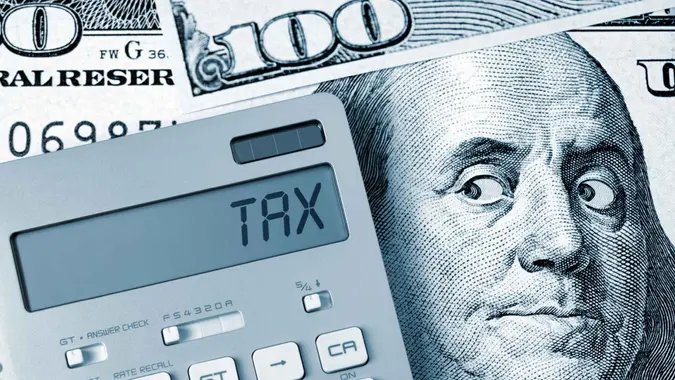Advertiser Disclosure
GOBankingRates works with many financial advertisers to showcase their products and services to our audiences. These brands compensate us to advertise their products in ads across our site. This compensation may impact how and where products appear on this site. We are not a comparison-tool and these offers do not represent all available deposit, investment, loan or credit products.
9 Things You Must Do When Your Tax Refund Is More Than $5,000
 Written by
Cynthia Measom
Written by
Cynthia Measom
 Edited by
Chris Cluff
Edited by
Chris Cluff

Commitment to Our Readers
GOBankingRates' editorial team is committed to bringing you unbiased reviews and information. We use data-driven methodologies to evaluate financial products and services - our reviews and ratings are not influenced by advertisers. You can read more about our editorial guidelines and our products and services review methodology.

20 YearsHelping You Live Richer

Reviewed by Experts

Trusted by Millions of Readers
According to a recent GOBankingRates survey about taxes, the top three things people are planning to do with their refunds are put it in savings, pay off debt or pay bills.
“Receiving a tax refund of $5,000 or more presents a unique opportunity to make strategic financial moves that can significantly impact your financial health both in the short and long term,” said Reagan Bonlie, founder of Nudge Money.
Here are nine things you must do when your tax refund is more than $5,000.
Contribute to Your Emergency Fund
“If you don’t already have an emergency fund, or if it’s not fully funded,” Bonlie said, “using your tax refund to establish or bolster this fund is a wise decision.”
If you’re wondering what “fully funded” means, Bonlie said experts often recommend having three to six months’ worth of living expenses saved.
She explained that an emergency fund can serve as a financial lifeline when unexpected expenses arise, such as the loss of a job or a medical emergency, providing security without the need to rack up debt.
Pay Down High-Interest Debt
If you choose to apply your tax refund toward high-interest debts you may have, including credit cards, personal loans or payday loans, you can save a significant amount in interest payments, Bonlie said.
“This not only reduces your overall debt burden but can also improve your credit score by lowering your credit utilization ratio,” she said.
Invest In Your Retirement
Taylor Kovar, certified financial planner and CEO at Kovar Wealth Management, said a smart move for your tax return funds could be to invest in an individual retirement account.
“The power of compound interest can turn your $5,000 into a much larger sum over the years, providing a more comfortable retirement,” he said. “For example, investing $5,000 at an average return of 7% annually could grow to over $19,000 in 20 years.”
Invest In Yourself
Bonlie said to consider using part of your refund to invest in personal or professional development courses, certifications or further education, which can pay off in more ways than one.
“Enhancing your skills or advancing your education can lead to better job opportunities, higher income and improved job security,” she said.
Make Home Improvements
“If you own your home, investing in energy-efficient upgrades or necessary repairs can increase your home’s value, reduce utility costs and prevent more costly repairs in the future,” Bonlie said.
She suggested home improvements, such as blown-in insulation, HVAC system upgrades or solar panels, which can offer long-term energy savings.
Invest In Healthcare
“Investing in your health, such as purchasing a quality health insurance plan, paying for necessary medical procedures or even funding a Health Savings Account (HSA), if eligible, can prevent financial strain due to medical expenses in the future,” Bonlie said.
Save for a Goal
If you have an emergency fund, no high-interest debt and have maxed out your contributions to your retirement accounts, consider saving for a goal you have.
“Whether it’s saving for a down payment on a house, a vacation or your child’s education,” Bonlie said, “allocating part of your refund towards these goals can help you achieve them sooner without resorting to debt.”
Make Charitable Donations
If you’re in a stable financial position, Bonlie said, consider using a portion of your refund to donate to a charitable cause.
“This can not only help those in need but may also provide you with tax deductions for the next year, depending on your tax situation,” she said.
Consider Adjusting Your Pay Stub Witholdings
Christopher Stroup, certified financial planner for Abacus Wealth Partners, said a large tax refund means you’re overpaying your required share of taxes to the federal government.
“A tax refund is essentially an interest-free loan you’ve provided to the government,” Stroup said. “Given the time value of money, it’d be a smarter financial move to adjust your tax withholdings at your employer to reduce your taxes withheld so that more money hits your pocket each pay period rather than overpaying taxes throughout the year, only to recoup that overpayment via your tax refund.
“The IRS has a really nice tax withholding estimator that you can use to better understand if your tax withholdings are appropriate or should be adjusted.”
More From GOBankingRates
Share This Article:




You May Also Like

Taxes Are Still Complicated, and It's Costing Americans Billions -- How You Can Save This Season
January 15, 2026
5 min Read


Are Moving Expenses Tax-Deductible? Rules, Exceptions and What Qualifies
January 16, 2026
5 min Read


Do I Need To File a Tax Return? How To Know -- and When Filing Is Worth It
January 16, 2026
5 min Read


Home Office Tax Deduction Explained: When You Can Write Off Home Office Expenses
January 15, 2026
5 min Read





Make your money work for you
Get the latest news on investing, money, and more with our free newsletter.
By subscribing, you agree to our Terms of Use and Privacy Policy. Unsubscribe at any time.


Thanks!
You're now subscribed to our newsletter.
Check your inbox for more details.



Sending you timely financial stories that you can bank on.
Sign up for our daily newsletter for the latest financial news and trending topics.
For our full Privacy Policy, click here.
Looks like you're using an adblocker
Please disable your adblocker to enjoy the optimal web experience and access the quality content you appreciate from GOBankingRates.
- AdBlock / uBlock / Brave
- Click the ad blocker extension icon to the right of the address bar
- Disable on this site
- Refresh the page
- Firefox / Edge / DuckDuckGo
- Click on the icon to the left of the address bar
- Disable Tracking Protection
- Refresh the page
- Ghostery
- Click the blue ghost icon to the right of the address bar
- Disable Ad-Blocking, Anti-Tracking, and Never-Consent
- Refresh the page






